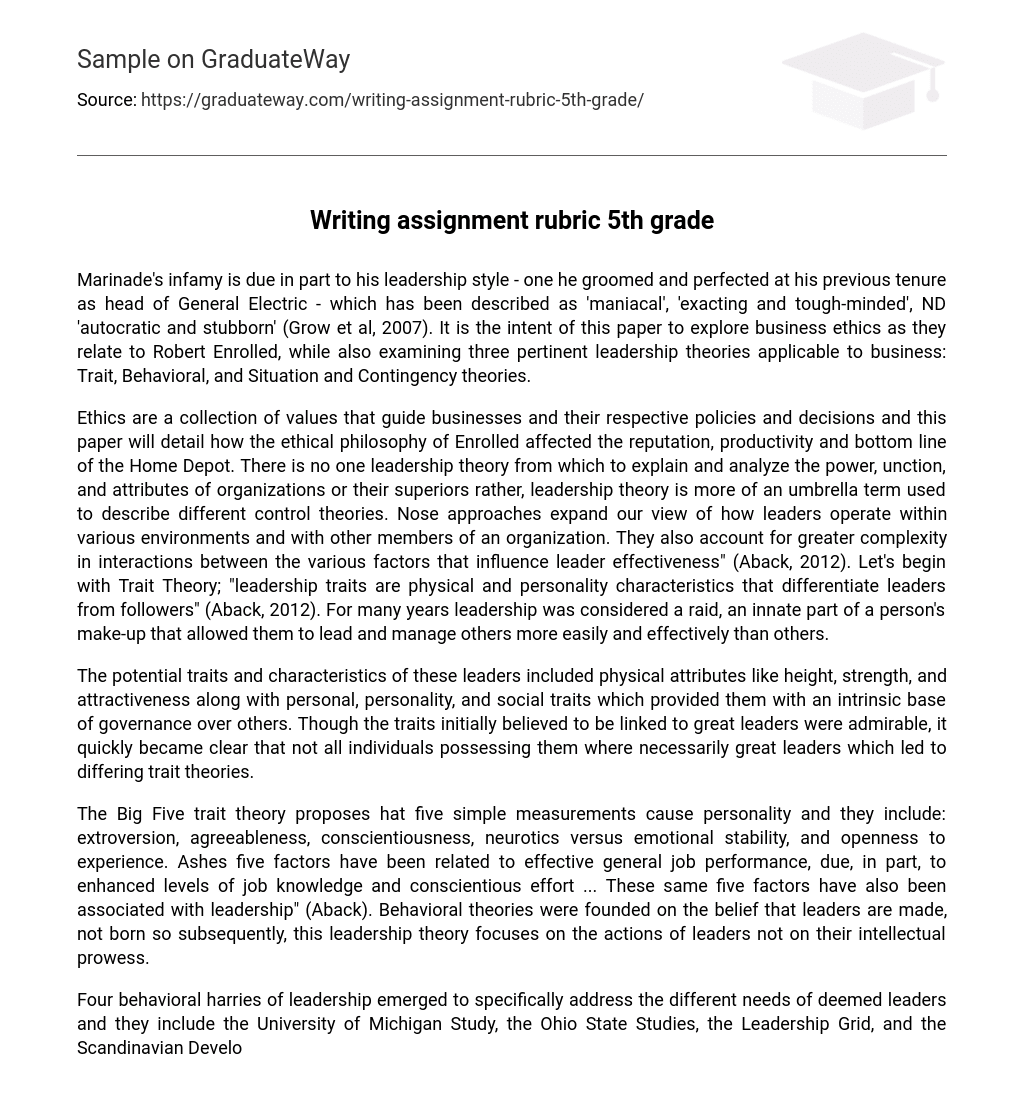Marinade’s infamy is due in part to his leadership style – one he groomed and perfected at his previous tenure as head of General Electric – which has been described as ‘maniacal’, ‘exacting and tough-minded’, ND ‘autocratic and stubborn’ (Grow et al, 2007). It is the intent of this paper to explore business ethics as they relate to Robert Enrolled, while also examining three pertinent leadership theories applicable to business: Trait, Behavioral, and Situation and Contingency theories.
Ethics are a collection of values that guide businesses and their respective policies and decisions and this paper will detail how the ethical philosophy of Enrolled affected the reputation, productivity and bottom line of the Home Depot. There is no one leadership theory from which to explain and analyze the power, unction, and attributes of organizations or their superiors rather, leadership theory is more of an umbrella term used to describe different control theories. Nose approaches expand our view of how leaders operate within various environments and with other members of an organization. They also account for greater complexity in interactions between the various factors that influence leader effectiveness” (Aback, 2012). Let’s begin with Trait Theory; “leadership traits are physical and personality characteristics that differentiate leaders from followers” (Aback, 2012). For many years leadership was considered a raid, an innate part of a person’s make-up that allowed them to lead and manage others more easily and effectively than others.
The potential traits and characteristics of these leaders included physical attributes like height, strength, and attractiveness along with personal, personality, and social traits which provided them with an intrinsic base of governance over others. Though the traits initially believed to be linked to great leaders were admirable, it quickly became clear that not all individuals possessing them where necessarily great leaders which led to differing trait theories.
The Big Five trait theory proposes hat five simple measurements cause personality and they include: extroversion, agreeableness, conscientiousness, neurotics versus emotional stability, and openness to experience. Ashes five factors have been related to effective general job performance, due, in part, to enhanced levels of job knowledge and conscientious effort … These same five factors have also been associated with leadership” (Aback). Behavioral theories were founded on the belief that leaders are made, not born so subsequently, this leadership theory focuses on the actions of leaders not on their intellectual prowess.
Four behavioral harries of leadership emerged to specifically address the different needs of deemed leaders and they include the University of Michigan Study, the Ohio State Studies, the Leadership Grid, and the Scandinavian Development- Oriented Approach. The University of Michigan Study “identified Job-centered or production-oriented managers and employee-centered leaders, arguing that people-oriented leaders would build better teams and create a better workplace environment” (Aback, 2012). The Ohio State University Studies examined two distinct features of leadership: initiating structure and consideration.
Initiating Truckee refers to the phase of leadership that precedes activity, it is the planning and organizing phase where leaders detail tasks for group members. Consideration “is leadership behavior that expresses concern for employees by establishing a warm, supportive, friendly climate. Leaders exhibit consideration through concern for worker comfort, well-being, and satisfaction” (Aback, 2012). Situational and contingency theories contend that leadership is not a universal trait rather, effective leaders acclimate to the changing conditions and scenarios they encounter.
Fiddler’s Contingency Model is a key player within contingency harries with the premise being “the performance of interacting groups is contingent upon the interaction of leadership styles and the affordability of the situation for the leader” (Mitchell et al, 1970). “The contingency approach recommends task-oriented (low Least Preferred Coworker) leaders for situations with low or high control and relationship-oriented leaders (high LAP) for situations exhibiting moderate levels of potential control” (Aback, 2012).
Hershey and Blanchard situational leadership model proposes that effective leaders alter their approach based on the employees they are tasked to manage, to est. utilize the strengths of said employees. Returning to former Home Depot executive Robert Enrolled, and relating the aforementioned leadership theories to his controversial leadership style, I deduce that the behavioral theory associated with the University of Michigan studies is most relevant. In that study the effects of leader behavior on job performance was examined and two leadership styles were the result, either job centered or employee centered.
Marinade’s leadership and managerial style is most aligned with the job centered, also known as production-oriented, approach of this study in that he focused on the “technical aspects of the job, including finding better methods of operation, with the goal of increasing output through individuals and groups. The principal concerns of production-oriented leaders include reaching production goals, keeping costs in line, and following schedules” (Aback, 2012). While under Marinade’s leadership sales at the Home Depot “soared from $46 billion in 2000, the year Enrolled took over, to $81. Billion in 2005, an average annual growth rate of 12%. Profits more than doubled, to $5. 8 billion that year” (Grow et al, 2007). Despite the infamy surrounding Marinade’s tenure at Home Depot related to his attitude ND approach, I do not consider him unethical. Certainly, his leadership style was more aligned with Wall Street and production rather than a consumer- driven industry, but in the end his leadership style allowed the company to grow financially and make it most competitive within its’ retail industry.
It was the intent of this paper to explore business ethics as they relate to Robert Enrolled the former CEO of Home Depot, while also examining three pertinent leadership theories applicable to business: Trait, Behavioral, and Situation and Contingency theories. Ethics have been described as a collection of values that dude businesses and their respective policies and decisions, and in the end my perspective was that Enrolled was not unethical while at the helm, despite his oftentimes dubious leadership techniques.





